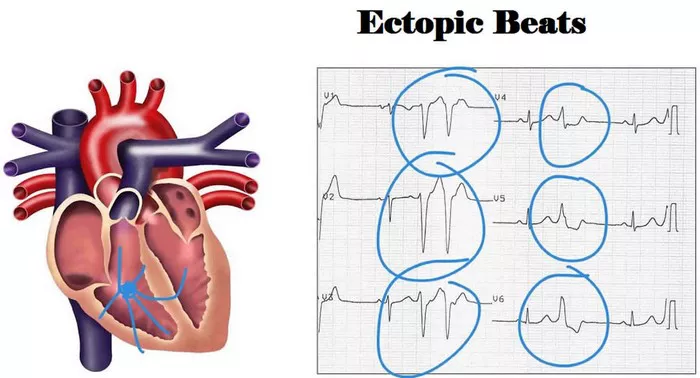In the vast and complex world of cardiac rhythms, ectopic beats often emerge as a topic of concern and curiosity for many. These irregular heartbeats, seemingly out of sync with the heart’s usual rhythm, can stir anxiety and prompt questions about their significance, origins, and implications for heart health. This comprehensive exploration aims to demystify ectopic beats, offering insights into when they might warrant concern and how they fit into the broader spectrum of cardiac health.
Understanding Ectopic Beats: An Introduction
Ectopic beats are extra heartbeats that originate from outside the heart’s primary pacemaker, the sinoatrial (SA) node. They can arise from the atria (atrial ectopic beats) or the ventricles (ventricular ectopic beats) and are distinguished by their timing and origin. While often perceived as anomalies, they are, in fact, not uncommon in the general population, including among those with and without heart disease.
The Mechanisms Behind Ectopic Beats
To comprehend the significance of ectopic beats, it’s essential to understand their genesis. The heart’s rhythm is typically orchestrated by the SA node, but various factors such as electrolyte imbalances, ischemia, stress, stimulants, and structural heart changes can prompt other parts of the heart to initiate beats. These ectopic impulses disrupt the heart’s usual rhythm, leading to the perception of a skipped or extra beat.
Differentiating Between Atrial and Ventricular Ectopic Beats
Atrial ectopic beats, originating from the heart’s upper chambers, are generally considered less worrisome than ventricular ectopic beats, which stem from the lower chambers. The latter can be more symptomatic and, in certain contexts, may signal underlying cardiac issues, particularly if they are frequent, polymorphic (varying in form), or occur in sequences (such as in triplets or ventricular tachycardia).
Symptoms and Detection
Many individuals with ectopic beats may remain asymptomatic, while others may experience palpitations, a sensation of the heart skipping a beat, or a feeling of an extra beat. Diagnosis typically involves an electrocardiogram (ECG) or a Holter monitor, which records the heart’s electrical activity over a longer period, allowing for the detection and analysis of ectopic beats.
When Should You Be Worried About Ectopic Beats?
1. Symptomatology: Persistent or worsening symptoms, such as dizziness, chest pain, or shortness of breath accompanying ectopic beats, should prompt immediate medical evaluation.
2. Frequency and Pattern: Frequent ectopic beats, particularly if they are ventricular in origin or occur in rapid succession (non-sustained ventricular tachycardia), may necessitate further investigation to rule out underlying cardiac conditions.
3. Underlying Heart Disease: Individuals with known heart disease, previous myocardial infarction, or heart failure are at a higher risk of complications from ectopic beats. In such cases, ectopic beats might indicate worsening heart health or the development of new cardiac issues.
4. Electrolyte Imbalances and Drug Use: Ectopic beats triggered by electrolyte imbalances or the use of stimulant drugs (including certain medications) may require adjustments in diet, lifestyle, or medication regimens.
5. After Physical Activity: While ectopic beats can occur during or after exercise, an increase in ectopic activity post-exercise may warrant further cardiac evaluation to exclude exercise-induced arrhythmias or ischemia.
Diagnosis and Evaluation
The evaluation of ectopic beats involves a detailed medical history, physical examination, and diagnostic tests such as an ECG, exercise stress test, echocardiogram, or advanced cardiac imaging, depending on the individual’s symptoms and risk factors. The goal is to identify any underlying heart conditions and to assess the ectopic beats’ frequency, pattern, and impact on the heart’s function.
Management Strategies
Management of ectopic beats may vary from watchful waiting in asymptomatic individuals with no underlying heart disease to medical intervention in more symptomatic cases or those with associated cardiac conditions. Treatment options can include lifestyle modifications, medication to control heart rate or rhythm, and, in rare cases, invasive procedures such as catheter ablation.
Lifestyle Modifications and Prevention
Simple lifestyle changes can significantly impact the frequency and perception of ectopic beats. These include reducing caffeine and alcohol intake, avoiding stimulant drugs, managing stress, and correcting electrolyte imbalances through diet or supplements. Regular cardiovascular exercise, within limits advised by a healthcare professional, may also improve heart health and reduce ectopic beat occurrences.
The Psychological Impact of Ectopic Beats
The sensation of ectopic beats can lead to anxiety and stress, creating a vicious cycle that may exacerbate the perception of palpitations. Psychological support, stress management techniques, and sometimes counseling or therapy can be beneficial in managing these aspects of ectopic beats.
Looking Ahead: Advances in Understanding and Management
Ongoing research into the mechanisms, diagnosis, and treatment of ectopic beats continues to refine our understanding and management of this condition. Innovations in cardiac imaging and monitoring, along with advancements in non-invasive and minimally invasive therapies, promise to enhance our ability to tailor treatments to individual needs and reduce the burden of ectopic beats on quality of life.
Conclusion
Ectopic beats are a common cardiac phenomenon that, in many cases, do not signal serious health issues. However, their presence, especially when accompanied by symptoms or occurring in individuals with underlying heart conditions, warrants careful evaluation. Understanding when ectopic beats may pose a risk is crucial in guiding appropriate diagnostic and management strategies, ensuring heart health, and alleviating unnecessary anxieties related to these irregular heartbeats. By fostering awareness and encouraging proactive health management, individuals can navigate the complexities of ectopic beats with confidence and clarity.

